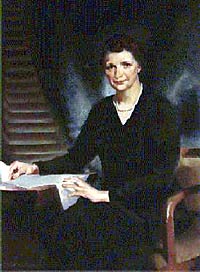Readings:
Deuteronomy 15:7-11
Psalm 37:27-31
Ephesians 4:25—5:2
Luke 9:10-17Preface of Baptism
[Common of a Prophetic Witness]
[Common of a Saint]
[For All Baptized Christians]
[For Vocation in Daily Work]
PRAYER (traditional language)
Loving God, we bless thy Name for Frances Perkins, who in faithfulness to her baptism envisioned a society in which all may live in health and decency: Help us, following her example and in union with her prayers, to contend tirelessly for justice and for the protection of all, that we may be faithful followers of Jesus Christ; who with thee and the Holy Spirit liveth and reigneth, one God, for ever and ever. Amen.
PRAYER (contemporary language)
Loving God, we bless your Name for Frances Perkins who in faithfulness to her baptism envisioned a society in which all may live in health and decency: Help us, following her example and in union with her prayers, to contend tirelessly for justice and for the protection of all, that we may be faithful followers of Jesus Christ; who with you and the Holy Spirit lives and reigns, one God, for ever and ever. Amen.
Lessons revised in Lesser Feasts & Fasts 2024.
Return to Lectionary Home Page
Webmaster: Charles Wohlers
Last updated: 16 March 2025
FRANCES PERKINS
PUBLIC SERVANT AND PROPHETIC WITNESS, 1965
 Frances Perkins (April 10, 1880– May 14, 1965) was the U.S. Secretary of Labor from 1933 to 1945, and the first woman appointed to the U.S. Cabinet. As a loyal supporter of her friend, Franklin D. Roosevelt, she helped pull the labor movement into the New Deal coalition. She and Interior Secretary Harold Ickes were the only original members of the Roosevelt cabinet who remained in offices for his entire presidency. During her term as Secretary of Labor, she was largely responsible for the U.S. adoption of social security, unemployment insurance, federal laws regulating child labor, and adoption of the federal minimum wage.
Frances Perkins (April 10, 1880– May 14, 1965) was the U.S. Secretary of Labor from 1933 to 1945, and the first woman appointed to the U.S. Cabinet. As a loyal supporter of her friend, Franklin D. Roosevelt, she helped pull the labor movement into the New Deal coalition. She and Interior Secretary Harold Ickes were the only original members of the Roosevelt cabinet who remained in offices for his entire presidency. During her term as Secretary of Labor, she was largely responsible for the U.S. adoption of social security, unemployment insurance, federal laws regulating child labor, and adoption of the federal minimum wage.
Perkins was born in Boston, Massachusetts and spent much of her childhood in Worcester. She attended Worcester's Classical High School and was graduated from Mount Holyoke College with a BA degree in chemistry in 1902, and from Columbia University with a master's degree in sociology in 1910.
She achieved statewide prominence as head of the New York Consumers League in 1910 and in that position she lobbied with vigor for better working hours and conditions. The next year, she witnessed the tragic Triangle Shirtwaist Factory fire, a pivotal event in her life. In 1918, Perkins accepted Governor Al Smith's offer to join the New York State Industrial Commission, becoming its first female member. She became chairwoman of the commission in 1926.
In 1929 the newly-elected New York governor, Franklin D. Roosevelt, appointed Perkins as the state industrial commissioner. Having earned the cooperation and respect of various political factions, Perkins ably helped put New York in the forefront of progressive reform. She expanded factory investigations, reduced the workweek for women to 48 hours, and championed minimum wage and unemployment insurance laws.
In 1933 President Roosevelt appointed Perkins as Secretary of the Department of Labor, a position she held for twelve years, longer than any other Secretary of Labor. With few exceptions, President Roosevelt consistently supported the goals and programs of Secretary Perkins. In an administration filled with compromise, the president's support for the agenda of Frances Perkins was unusually constant.
As Secretary of Labor, Perkins played a key role in the cabinet by writing New Deal legislation, including minimum-wage laws. Her most important contribution, however, came in 1934 as chairwoman of the President's Committee on Economic Security. In this post, she was involved in all aspects of the reports and hearings that ultimately resulted in the Social Security Act of 1935.
Following her tenure as Secretary of Labor, in 1945 Perkins was asked by President Harry Truman to serve on the United States Civil Service Commission, which she did until 1952, when her husband died and she resigned from federal service. During this period, she also published a memoir of her time in FDR's administration called The Roosevelt I Knew, which offered a sympathetic view of the president.
Following her government service career, Perkins remained active as a teacher and lecturer at the New York State School of Industrial and Labor Relations at Cornell University until her death in 1965 at age 85.
— more at Wikipedia
As a young adult she discovered the Episcopal Church and was confirmed at the Church of the Holy Spirit in Lake Forest, Illinois, on June 11, 1905, and was a faithful and active Episcopalian for the remainder of her life.
During her time as Secretary of Labor, she would take time away from her duties on a monthly basis and make a retreat with the All Saints' Sisters of the Poor in nearby Catonsville, Maryland.
— from Holy Women, Holy Men
More information is available from the Frances Perkins Center (particularly the page "Frances Perkins and Faith"), and from the New York State Oral History Project. The most recent biography of her is The Woman Behind the New Deal: The Life of Frances Perkins, by Kristin Downey.